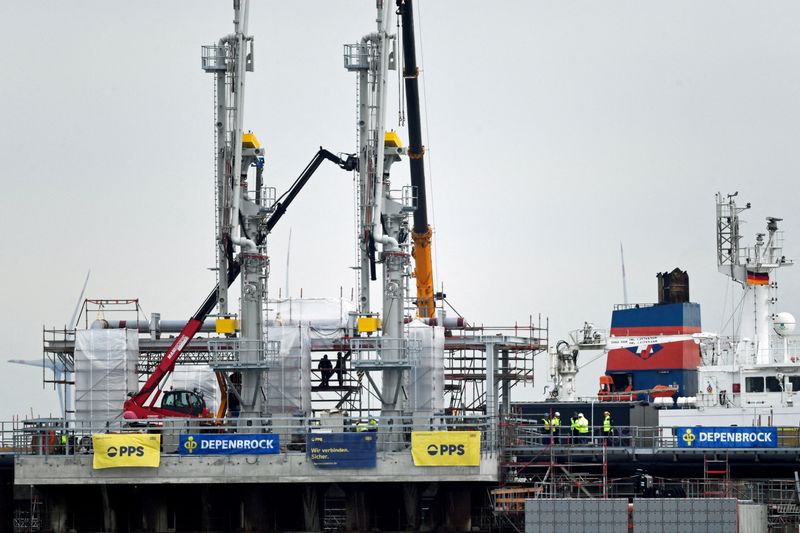
© Reuters. FILE PHOTO: General view of the new floating LNG gas terminal, which allows Germany to import LNG via ship from other countries, in the harbour in Wilhelmshaven, Germany, November 15, 2022. REUTERS/Fabian Bimmer/File Photo
BERLIN (Reuters) – Here are some details of legislation passed by Germany’s lower house of parliament on Thursday to cap gas and power prices for consumers up to April 2024 and in return tax utility profits deemed to be excessive.
WHAT NEXT AND WHY?
The bill is expected to be passed through the upper chamber on Friday.
Russia’s large-scale withdrawal from its former role especially as the main gas supplier to Germany and Europe drove up wholesale prices to sky-high levels this year, contributing to inflationary pressures and huge support programmes in Europe’s largest economy.
As Germany aims to wean itself off its dependency on Russia and on fossil fuels, the package also includes aid for new renewable projects.
COST
The plans on Thursday allow for government spending of 100 billion euros ($107 billion) on subsidising power and gas bills.
The windfall tax could bring it a double-digit billion number, the government has said without going into details, but that is hard to gauge as prices and earnings are in constant flux, driven by market developments.
POWER PRICE BRAKE
A brake on power prices will be implemented in March but applied retroactively to January and February, capping 80% of the previous year’s bill at 40 cents per kilowatt hour (kWh).
Industry customer prices are to be set for 70% of previous usage at 13 cents/kWh.
The stipulations are expected to encourage consumers to avoid excessive usage as it would become proportionally more expensive.
GAS PRICES
A brake on gas prices is also backdated and caps the equivalent of 80% of the prior year bill at 12 cents per kWh.
Industry customer prices are to be set for 70% of consumption at 7 cents.
BONI, DIVIDENDS
Companies receiving state support to compensate them for additional costs amid scarcity and high prices must forego those above certain cut-off points.
WINDFALL TAX
A levy from December 2022 through April 2024 is aimed at skimming off excessive energy profits and targets companies whose production costs have not risen substantially, such as nuclear or renewable power generators.
The argument is they benefitted from higher revenues inadvertently due to spillover especially from gas prices, since gas plants’ costs act as wholesale market price setters.
The final version bore account of the need to avoid hurting new investments and upsetting wholesale market dynamics.
RENEWABLES
Bidding prices for state tenders for renewable project can be raised by up to 25% to stimulate more projects actually being executed.


Be the first to comment